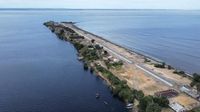The development of the Democratic Republic of the Congo's (DRC) first deep sea port, Banana Port, has reached a significant milestone with the appointment of Mota-Engil to lead its construction. Situated along the DRC’s narrow 22-mile Atlantic coastline and near the mouth of the Congo River in Kongo Central province, Banana Port is set to become the primary maritime gateway for containerized trade in the country.
DP World, which operates the port, announced the selection of Mota-Engil, a Portuguese engineering conglomerate, due to its extensive experience in port development and logistics within Africa. Mota-Engil is currently involved in operating the Lobito Corridor—an essential railway link that unites DRC's copper belt to Angola's Lobito port. This corridor is recognized as one of Africa’s most critical infrastructure projects, facilitating trade between DRC, Zambia, and global markets.
Sultan Ahmed bin Sulayem, the CEO of DP World, remarked, "By partnering with Mota-Engil, we are ensuring that this world-class infrastructure is built to the highest standards, fostering economic growth. Banana Port is a transformative project that will reshape the trade and logistics landscape of the DRC." His comments reflect the ambitious goals set for the new port, which is expected to enhance the country's logistical capabilities considerably.
Notably, the construction of Banana Port is designed not just to bring in foreign expertise but also to involve local enterprises in the process. This initiative is projected to create approximately 85,000 jobs and generate an economic output of around $430 million annually once the port is operational.
The first phase of Banana Port's development includes erecting a 600-meter quay with a depth of 18 meters, enabling the facility to accommodate large container vessels. This infrastructure is vital, as it positions the port to handle significant amounts of cargo—projected at a capacity of 450,000 TEUs (Twenty-foot Equivalent Units) per year—and features 30 hectares of storage area.
Looking ahead, the second phase of development will extend the quay by over two kilometers, further enhancing the port's capabilities and its potential to attract more shipping activity to the region. With this systematic expansion, stakeholders believe that the port will act as a critical strategic asset for sustaining economic growth in DRC.
The funding for this pivotal project is primarily sourced from DP World in conjunction with British International Investment (BII), which is the UK’s development finance institution. Last year, BII showcased its commitment by pledging up to $35 million towards the first phase of Banana Port’s construction.
The establishment of Banana Port comes at a crucial time for the DRC, a nation rich in natural resources but historically plagued by infrastructural challenges that have hampered trade and economic expansion. By enhancing maritime capabilities, the DRC aims to integrate more fully into global supply chains and leverage its strategic position on the African continent.
As the construction of the port progresses, local and international observers remain optimistic. The expectation is that Banana Port will not just be a logistical hub, but a catalyst for economic diversification and resilience in a country that has immense potential yet faces systemic developmental hurdles.
In summary, with the strategic partnerships formed and significant investment pledged, DRC's Banana Port represents a bright horizon. This project symbolizes hope for cleaner, more efficient trade practices, sustainable job creation, and a leap toward self-sufficiency in a country primed for growth.

